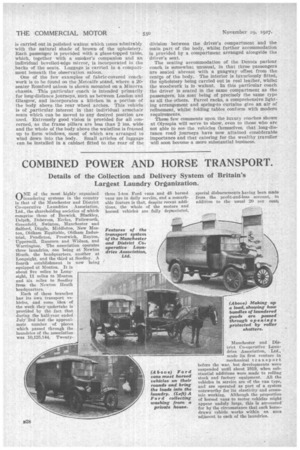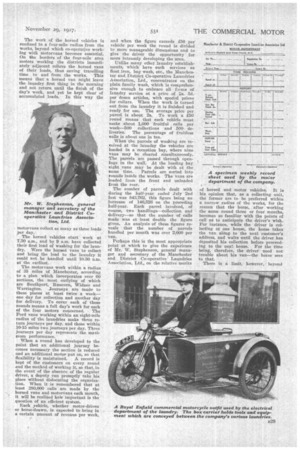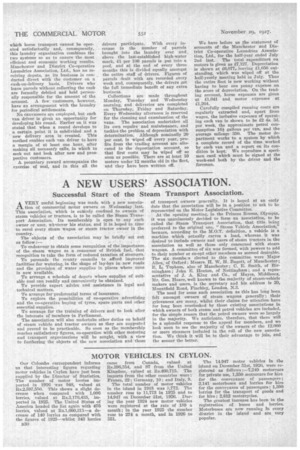COMBINED POWER AND HORSE TRANSPORT.
Page 54

Page 55

Page 56

If you've noticed an error in this article please click here to report it so we can fix it.
Details of the Collection and Delivery System of Britain's Largest Laundry Organization.
0NE of the most highly organized laundering systems in the country is that of the Manchester and District Co-operative Laundries Association, Ltd., the shareholding societies of which comprise those of Beswick. Blackley, Delpth, Dobeross, Eccles, Failsworth, Greenfield, Swinton, Manchester and Salford, Diggle, Middleton, New Moston. Oldham Equitable, Oldham Industrial, Pendleton, Prestwich, Royto», Uppermill, Runcorn and Widnes, and Warrington. The association operates three laundries, one being at Newton Heath. -the headquarters, another at
• Longsight, and the third at Seedley. A fourth establishment is now being equipped at Mouton. It is about five miles to Longsight, 11 miles to Mouton and six miles to Seedley from the Newton Heath headquarters.
Each of these branches has its own transnort vehicles, and some idea of the work they undertake is provided by the fact that during the half-year ended July 2nd last the approximate number of pieces which passed through the laundries of the. association was 10,125,144. Twenty
(Above) Making up a load, showing how bundles of laundered goods are passed through openings protected by roller shutters.
Manchester and District Co-operative Laundries Association, Ltd., made its first venture in mechanical transport before the war, but developments were suspended until about 1919, when substantial additions were made to rolling stock and factory equipment. All the vehicles in service are of the van type, and are operated as part of a system noteworthy for its elasticity and economic working. Although the proportion of horsed vans to motor vehicles might appear unduly large, this is accounted' for by the circumstance that each horsedrawn vehicle works within an area adjacent to each of the laundries.
The work of the horsed vehicles is confined to a four-mile radius from the works, beyond which co-operative working with motorvans becomes essential. On the borders of the four-mile area motors working the districts immediately adjacent relieve the horsed vans of their loads, thus saving travelling time to and from the works. This • means that a horsed van might leave the laundry first thing in the morning and not return until the finish of the day's work, and yet be kept clear of accumulated loads. In this way the tnotorvans collect as many as three loads per day.
The horsed vehicles start work at 7.30 a.m., and by 9 a.m. have collected their first load of washing for the laundry. Were the horsed vans to collect and bring the load to the laundry it could not be handled until 10.30 a.m. at the earliest.
The motorvans work within a radius of 35 miles of Manchester, according to a plan which incorporates over 60 sections, the most outlying of which are Southport, Runcorn, Widnes and Warrington. Journeys are made to these places at least twice a week— one day for collection and another day for delivery. To cover each of these rounds means a full day's work for each of the four motors concerned. The Ford vans working within an eight-mile radius of the laundries make three return journeys per day, and those within 10-15 miles two journeys per day. Three journeys per day represents the, maximum performance.
When a round has developed to the point that an additional journey becomes necessary the section is reduced and an additional motor put on, so that
flexibility is maintained. A record is kept of the customers on every round and the method of working it, so that, in the event of the absence of the regular driver, a deputy can promptly take his place without dislocating the organisation. When it is remembered that at least 280,000 calls are made by the horsed vans and motorvans each month, it will be realized hoiv important is the question of an efficient system.
Each vehicle, whether motor-driven or horse-drawn, is expected to bring in a certain amount of revenue per week,
and when the figure exceeds £50 per vehicle per week the round is divided to moremanageable dimensions and to give the driver the opportunity for more intensely developing the area.
Unlike many other laundry establishments, which have such services as float iron, bag wash, etc., the Manchester and. District Co-operative Laundries Association, Ltd., concentrates on the plain family wash, which 'is comprehensive enough to embrace all forms of laundry service at a price of 2s. 3d. per dozen articles, with special prices for collars. When the work is turned out from the laundry it is finished and ready for use. The average price per parcel is about 2s. 'Co work a 150 round means that each vehicle must make about 1,000 fruitful calls per week-500 collections and 500 de liveries. The percentage of fruitless calls is about one in ten.
When the. parcels of washing are received at the laundry the vehicles are loaded in a reception bay, where nine vans may be cleared simultaneously. The parcels are passed through' openings in the wall. At the loading bay eight vans may be dealt with at the same time. Parcels are sorted into rounds inside the works. The vans are loaded front the front and unloaded from the rear.
The number of parcels dealt with during the half-year ended July 2nd last was 843,762, this figure being an increase of 146,526 on the preceding half-year. Each parcel involved, of course, two handlings---colleetion and delivery—so that the number of calls made was at least double the figure given. An analysis of these figures reveals that the number of parcels handled per month was over 2,000 per
van.
Perhaps this is the most appropriate point at which to give the experience of Mr. W. Stephenson, general manager and secretary of the Manchester and District Co-operative Laundries Association, Ltd., on the relative merits
of horsed and motor vehicles. It is his opinion that, as a collecting unit, the former are to be preferred within a narrow radius of the works, for the reason that the horse, after working the same round three or four months, becomes so familiar with the points of call as to anticipate the driver's wish. For instance, while the driver is collecting at one house, the horse takes the van along to the next customer's address, and waits until the driver has deposited his collection before proceeding to the next house. For the time being, therefore, the driver need not trouble about his van—the horse sees to that.
There is a limit, however, beyond which horse transport cannot be operated satisfactorily and, consequently, this laundry organization combines the two systems so as to ensure the most efficient and economic working results. Manchester and District Co-operative Laundries Association, Ltd., has no receiving depots, as its business is conducted direct with the customer on a cash-on-delivery basis. Drivers who leave parcels without collecting the cash are formally debited and held personally responsible for the amount of the account. A few customers, however, have an arrangement with the laundry for periodical settlements.
No canvassers are employed, but each van driver is given an opportunity for developing his round. Earlier on it was stated that when a round develops to a certain point it is subdivided and a ' new delivery area is created. This method enables each van driver to have a margin of at least one hour, after making all necessaey calls, in which to seek out and look after new and prospective customers.
A pecuniary reward accompanies the exercise of zeal, and in this all the drivers participate. With every in crease in the number of parcels brought into the laundry over and above the last-established high-water mark, £1. per 100 parcels is put into a pool, and at the end of every three months this is divided equally amongst the entire staff of drivers. Figures of parcels dealt with are recorded every week and, consequently, the drivers get the full immediate benefit of any extra business.
Collections are made throughout Monday, Tuesday and Wednesday morning, and deliveries are completed on Thursday, Friday and Saturday. Every Wednesday afternoon is reserved for the cleaning and examination of the vans. The association undertakes all its own repairs and maintenance, and tackles the problem of depreciation with determination. Although nominally 20 per cent, is wiped off every year, profits from the trading account are allocated to the depreciation account, so that first costs may be wiped off so soon as possible. There are at least 10 motors under 12 months old in the fleet, and they have been written off.
We have before us the statement of accounts of the Manchester and District Co-operative Laundries Association, Ltd., for the half-year ended July 2nd last. The total expenditure on motors is given as 17,127. Depreciation is shown at 16,077, leaving £1,050 outstanding, which was wiped off at the half-yearly meeting held in July. Thus the entire fleet is now working without having to bear one penny expense on the score of depreciation. On the trading account, horse expenses are given at £1,641 and motor expenses at 11,264.
Carefully compiled running costs are regularly extracted and, apart from wages, the inclusive expenses of operating each van is shown to be 12 4s. 3d. per week, the approximate petrol consumption 16igallons per van, and the average mileage 350. The motor department works to a system by which a complete record of the time worked by each van and a report on its condition is kept. We reproduce a specimen card which must be signed at the week-end both by the driver and the foreman.




















































































































